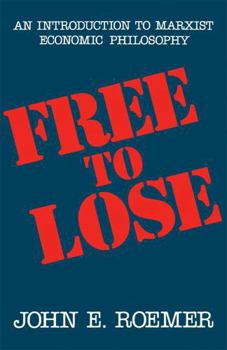Free to Lose: An Introduction to Marxist Economic Philosophy
Select Format
Select Condition 
Book Overview
Attacking the usefulness of such central Marxian concepts as the labor theory of value and surplus value, John Roemer reconstructs Marxian economic philosophy from the concepts of exploitation and class, showing that exploitation can be derived from a system of property relations. He then looks at the causes of the unequal distribution of wealth, including robbery and plunder, willingness to take risks, differential rates of time preference, luck, and entrepreneurship. He further examines the evolution of property systems--slave, feudal, capitalist, socialist--from the perspective of the theory of historical materialism, and ends by analyzing the properties of a social system in which ownership of productive assets in the external world is public, while ownership of internal productive assets--skills and talents--is private.
Format:Paperback
Language:English
ISBN:0674318765
ISBN13:9780674318762
Release Date:January 1988
Publisher:Harvard University Press
Length:216 Pages
Weight:0.80 lbs.
Dimensions:0.5" x 6.0" x 9.0"
Customer Reviews
1 rating
Roemer light
Published by Thriftbooks.com User , 21 years ago
John Roemer is an economist who has put some work into translating some ideas of Marx into the language of mainstream economics. His writings are generally very technical, which makes them accessible only to a small audience. Here he has written a book that is readable with minimal math (some linear algebra) and is still able to convey some rather deep ideas.The main theme of the book is exploitation. Roemer rejects the classical marxist concept of explotation, which is based on the labour value theory, on the grounds that the underlying economic theory is wrong and by showing that one can get perverse results on who-exploits-whom with the classical theory. He proposes a different concept of exploitation, one that traces exploitation not to work relations but to the distribution of productive assets. The way he conceptualizes exploitation doesn't even require a labor market. He also defines classes over the groups that arise in his models (who is a net seller of labor etc.).Since exploitation, defined in Roemer's way, stems from an unequal distribution of productive assets, the question of the immorality of exploitation can be reduced to questions of distributional justic, a topic Roemer adresses then from several angles. He concludes that a emphasis on exploitation is misplaced and one should discuss distribution of property directly.Roemer also adresses historical materialism and several "utopias". One could argue that this book fails to deliver what it promises; it is certainly not a introduction to the work of Karl Marx. On the other hand it is an excellent introduction to criticism of capitalism. Wether one agrees or not, the arguments are clear and rigorous. Hence five stars.





